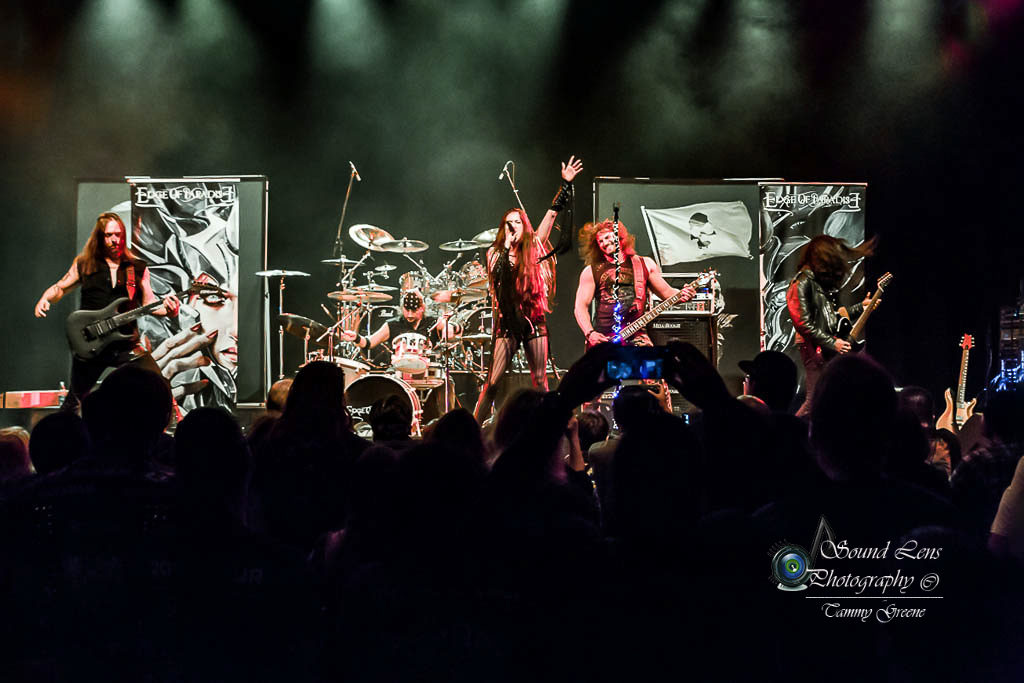
I’m here at the City National Grove of Anaheim speaking with Edge of Paradise starting on my left I have drummer John Chominsky, bassist Vanya Kapetanovic, guitarist David Ruiz, frontlady Margarita Monet and guitarist Dave Bates. It’s great to see you.
Tonight you are the opening band for HammerFall and Flotsam and Jetsam, two of my favorite bands. What does tonight mean to you as a group being on this bill with a Swedish Meal band, and a Thrash Metal band from Arizona?
Margarita Monet: Oh yeah, they’re Arizona.
Yes.
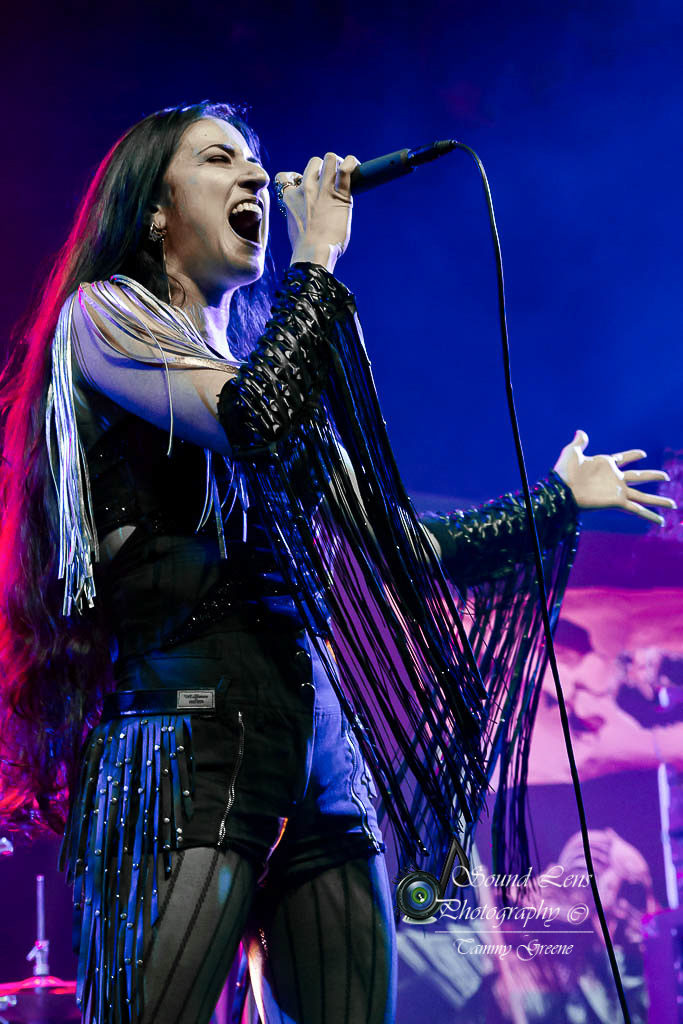
Margarita Monet: Well, it’s a really cool show for us because we haven’t played the Grove yet, and we’re in L.A. We’re based in Los Angeles, so it was on our list, and it’s always cool to play with a band like HammerFall. They’re from Sweden, and they’ve been around for a long time. So that’s going to be a cool experience, and then Flotsam and Jetsam, they’ve been around too. It’s like playing with veterans, so we’re just thrilled to be a part of it. Yeah.
You will have exposure from a different fan base. Do you think of that, in this situation?
Monet: That’s true. Yeah, because theirs is more of thrash metal fans crowd. I mean, we’re always– we like to expose ourselves to different demographics and just kind of take over the world one day.
We first met in January at NAMM 2018, in our interview, we introduced Edge of Paradise, to the readers, and dug into your EP “Alive.” Let’s find out what you’ve been up to since then.
Edge of Paradise has a new album in the works, being the third full-length album. What can you tell the fans at this time?
Dave Bates: We’re getting closer.
David Ruiz: Yeah. It’s a work in progress, but I personally feel like this is going to be a defining Edge of Paradise album. Like this is going to be. a band comes up and they record their first three, and they’re still kind of finding their sound, and then the fourth album is like this is when people talk about Edge of Paradise, I feel like this is going to be The Album.
Monet: Yeah, he’s right. I think the “Alive” EP was building up to this, and over the years I think our music really evolved. So I’m really looking forward to sharing with people the growth of the band, and it’s going to be our best music to date.
How about the album cover, will it be as dynamic?
Monet: It’ll be even more dynamic. I already talked to Timo Wuerz who made our last cover.
Okay.
Bates: We always use the same guy.
Monet: Yeah, so it’s going to be more epic.
Recently the band took a trip to Iceland to shoot “Face Of Fear” music video. I’m assuming this will be the first single released off the new album. Tell us about the song?
Monet: Okay. You want me to go?
Bates: That’s all on you.
Anybody.
Monet: So Face of Fear, can you stop? My God, guitar player. I’m trying to think.
Vanya Kapetanovic: I think he’s playing Face of Fear.
Bates: Yeah.
Monet: Okay, so the timeline of the song is, hate is the face of fear. So I think to live in the world that fueled by hate, especially in the world of social media. Everyone thinks it’s okay to just kind of spit out hate towards someone and they don’t realize how much it can affect the other person. So I read one time that hate, out of all the emotions are based in– I read somewhere that all human emotions are based in love and fear. So if someone exerts hate, it’s based on fear. That’s kind of where it comes from; hate is the face of fear. You know why is the world coming to such a point.
John Chominsky: It’s a pretty epic song, I think Iceland definitely is a pretty epic backdrop for it. The ground camera crew, drones flying in the air on the base of the glacier, on some mountaintops. The scenery there was pretty out of this world.
What drew you to Iceland to shoot the video?
Monet: Um…
Bates: We heard it was warm over there.
[Laughing]
Bates: Turns out it’s a lie.
Chominsky: They lied. So much for packing bathing suits.
Bates: Yeah [laughs].
Ruiz: Iceland, who knew!
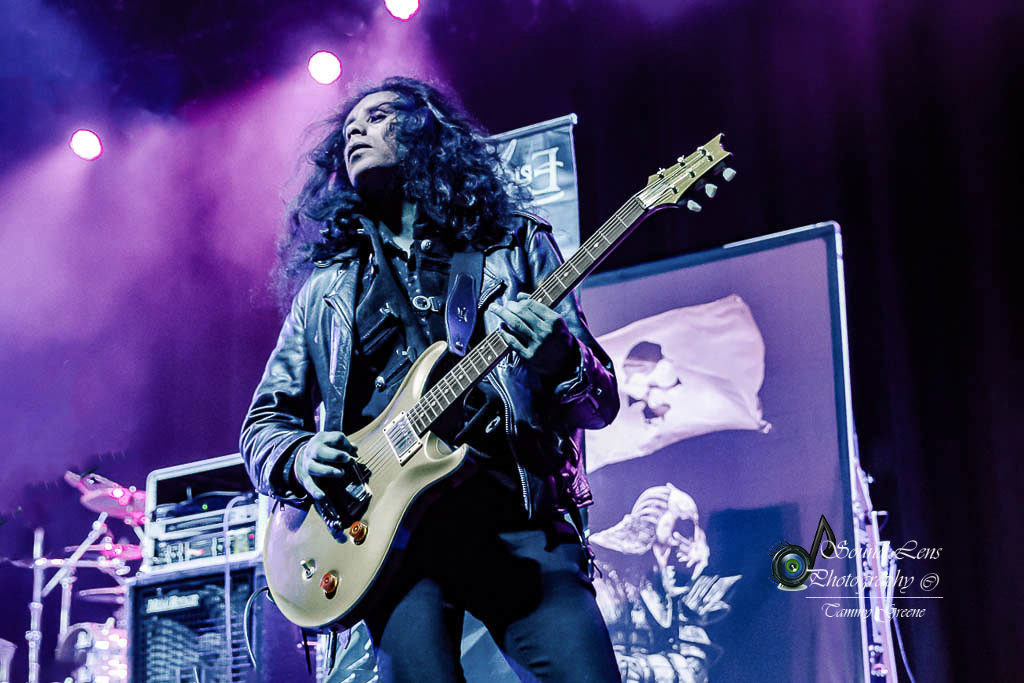
Monet: Right. I think it’s because it’s really kind of a vast place, and the feeling of the song really captures that type of the message of the song visually. We want to empower people with the song. When you’re in Iceland because we got a lot of drone shots, just like how beautiful this planet is.
Bates: It’s an epic location too.
Monet: So through imagery, we can convey the message of the song. I think we achieved it.
Bates: I think it’s an epic song, we wanted an epic place to do the video.
Monet: Yeah.
Who is the producer of the video?
Monet: Well, we kind of put it together, all of us.
Bates: Darren LaFreniere
Monet: We also had Darren LaFreniere from Arizona, he and his wife Tina helped in shooting the video.
Bates: They partnered. Yes.
Monet: We had a crew and Crystal, David’s girlfriend also came, she was a big help, so we were a bunch of Americans in Iceland.
I watched the behind the scenes video you shot; there were some hectic moments, the RV getting stuck…
Bates: Yeah. That’s a good one.
Ruiz: Again.
Dave about fell off the cliff, you Margarita nearly fell in the waterfall….
Ruiz: Margarita almost died.
Monet: I almost died freezing to death.
Oh, gosh! Keys were left in the room, along with the rental car keys. I didn’t see anything about you, John? No matter who you are, there seem to be mishaps, you care to share a couple of moments that you can look back on and laugh?
Bates: All of them.
Chominsky: Yeah, it’s so much fun.
Ruiz: There’s been too many, even in my short time I’ve been with the band. Since I joined the first tour proper trip, we got three flat tires on an RV. Three. We didn’t make it to the second stop.
Monet: Well, that was Nick’s fault, it doesn’t count.
Ruiz: That was Nick’s fault, but these guys all suffered their share.
Chominsky: Well, we’ve had a few falling outs here and there.
Monet: Yeah.
Chominsky: Tires are catching on fire.
Monet: But no, I think the whole trip was a lot of fun. I mean the first day we didn’t realize how cold it could be there. And when we were shooting the video, we weren’t wearing 10 layers of clothing, and it was really windy. We were like in the valley of the ocean.
Chominsky: Well, everybody else was, but Margarita wasn’t.
Yeah, your dress.
Chominsky: It wasn’t that bad when you were in the town.
Monet: Yeah.
Chominsky: Or you’re in the living area, but as soon as you start getting up the mountain.
Monet: It was very windy.
Chominsky: …there’s a significant change.
Monet: We were filming and all of a sudden like I’m feeling dizzy. Then I’m like, “Okay, I want to go sit for a little bit, and then I started shivering, and I couldn’t stop shivering. So Dave said we’re taking you to the hospital, and no way I want to go to the hospital in Iceland.
Bates: So I took her out to the RV, and then we drove out. We ended up finding a way back around that took two to three hours–
Monet: Because the RV wouldn’t make it up the hill, so we went around the island.
Bates: We wouldn’t make it, we got stuck, we had to be shuttled in by four-wheel drive, and then we figured there’s got to be a way to get around this impassible road, and we found it. So we had the heat cranking, and we just drove three hours, then we meet back up with them.
Monet: Yeah, but–
Bates: Fortunately, because it was raining on and off and they were outside, and John was outside with the drum kit, and it’s raining.
Chominsky: We got lots of good drums footage in the meantime.
Ruiz: Yeah, we did.
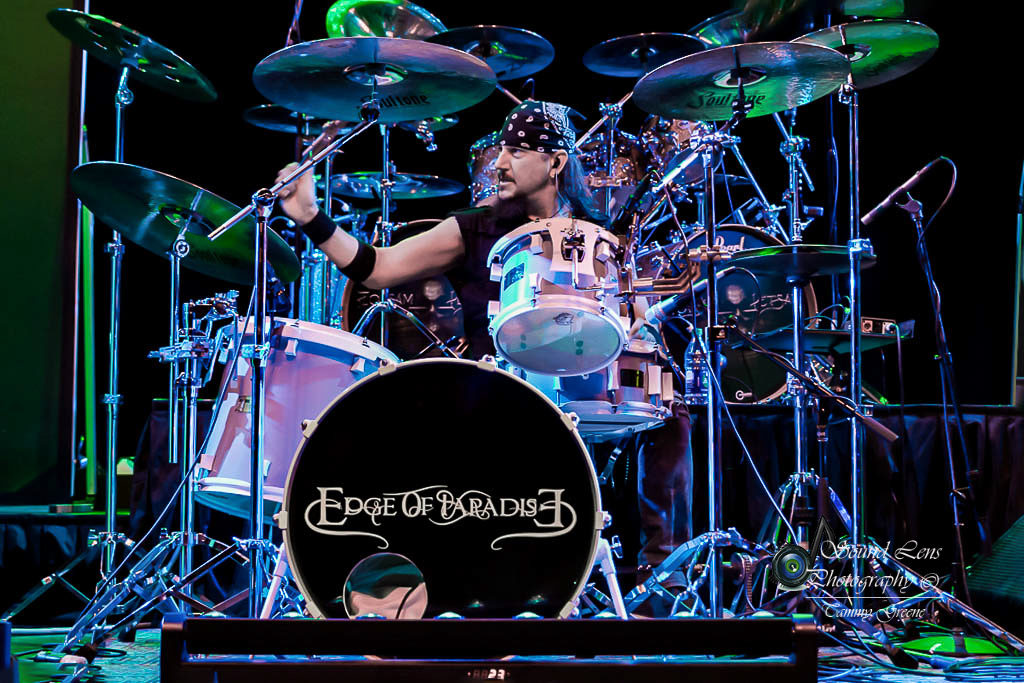
Monet: The rest of the days were fine, like one of the days we were on the beach and one of the places there looks like…
Bates: Like a glacier.
Monet: …like a different planet because these rocks have such weird formations, you don’t see it anywhere else.
Chominsky: The Black sand.
Monet: Yeah, we had a black sand beach. It was actually warm that day. I was wearing that jacket.
Bates: The glacier was probably warmer than the first day.
Ruiz: Oh yeah.
Monet: Yeah, the glacier was warm.
Before heading to Iceland, on the Edge of Paradise Facebook page, you posted about Postcards from Iceland, for $10.00 which helps with the music video you will receive a personalized, signed by the entire band postcard. In the behind the scenes video you made, your hands were full of postcards to be mailed. There seemed to be a good response from your loyal fan base. Have you done this before?
Bates: Yep.
Monet: You know, every time we release something, I send out postcards for free for the fans because we love people that are part of our world and I think they like it.
Bates: People who engage.
Monet: Yeah, I think a lot of people, rock fans they like something physical. Yeah, and I guess people that have been following us for a while, they’ve already been collecting our postcards so there’s probably maybe five or six before the Iceland one that I’ve been mailing out so it’s kind of like a collector’s item.
Nice.
Bates: And this time we figured instead of doing like everybody’s asking for money for free. We’re like it’s getting really expensive what can we do? We figured we’ll give something back. So it cost us $15.00 to mail each postcard, so we only lost five bucks.
[Laughing]
Ruiz: So it’s got a cool Iceland stamp on it.
Bates: So for $2000, I would go back to Iceland and mail postcards.
[Laughing]
I want to make sure we give credit where credit is due; it takes a lot of sponsorship and support. Tell us a little bit about the following company’s/people you have thanked.
Chominsky: Yeah, that’s a good one.
Souls of Rock Foundation.
Monet: We were kind of in awe that they– because we had the experiences before we talked to foundations that are outside of America and they don’t really support U.S. bands. You know, they support their local artists.
Bates: They’re in Switzerland.
Monet: So when we talked to Souls of Rock, and I submitted, I told them about the band, and I’m like, “We want to do this project, and this song is really important to us, and we want to send this message, and would you like to get involved?” And it was few months, the process, and then all of sudden like, “Let’s talk on Skype” and then they’re like, “Yeah, we’d like to support you guys.”
Bates: It was like in two weeks they were like, “Hey, do all this.”
Monet: So they really helped to cover the airfares.
Bates: They kind of got the ball rolling.
Monet: Yeah, they really helped make it happen.
Bates: Because once they stepped up, we were like “Okay, we’re going to do this because now it’s a reality.
Monet: Yeah, and the Souls of Rock Foundation is a clothing line “Souls of Rock.” So it’s kind of they’re building upon that, and then, they help bands to make music videos and also their live shows. They are looking to grow so we’re just happy to be a part of their growth as well. Very, very nice people, Daniel Spay is the main guy. We are very grateful.
Bates: Yeah, definitely. They helped us become…
Mark Ball of Ballmore
Monet: Yeah, Mark.
Bates: We meet him in North Carolina.
Monet: Yeah, North Carolina.
Bates: He’s a promoter.
Monet: Yeah, he’s a big supporter of the band, and we have to go back and play in North Carolina, and he’s a veteran, isn’t he?
Bates: Yeah, he was in Iraq war. He helped us majorly, I mean he also stepped up big time, which is a surprise because we didn’t really ask anything, but he wanted to be involved in the tour. So it’s cool to have that kind of help.
They believe in you.
Bates: … really where you need it. I mean, some of the stuff we’re doing is like when we get the idea, we’re like “That’s a really good idea. Let’s do that” And then we start doing it, putting it together and you realize, “Wow, it cost a lot of money.” It’s like it gets real expensive real fast so without like a village you can’t build it.
Monet: Yeah, so all those people are just helping us make it happen.
Ruiz: And even Darren LaFreniere, just want to throw his name in there.
Bates: Yeah, Darren. We couldn’t have done it without him.
Monet: Yeah, Darren. We could not; he has all the equipment.
Ruiz: We couldn’t have done the video without Darren.
Bates: He is like God. He’s already one of our band members.
Monet: Yeah, he’s part of the family.
Chominsky: We would have been stuck on the freakin’ mountains.
Monet: Yeah, he rescued us.
Chominsky: He had a four-wheel drive. Yep.
Dominic DeBrum of Out of Order Live
Monet: Yeah, Dominic has been the supporter of us for a while, and he’s a promoter, and he has this play, shows, we played in New Jersey for him once.
Ruiz: New Jersey and Arizona.
Monet: and Arizona a lot. So these people throughout the years have built relationships with. Yeah, he’s a friend.
Al Bane for Leather / Vampire Rockstar Clothing.
Monet: Yeah, yes, so Al Bane Leather partnered with Vampire Rockstar clothing, they made that jacket I was wearing in the video.
Bates: And a cool guitar strap, yeah.
Monet: And the guitar strap.
Bates: That guitar strap is what saved me from falling off the cliff.
I thought… I thought it was the guitar.
Bates: I was off the edge, and I threw the strap as I was falling, and it caught the rock. I was like, “Fuck. Thank god for the strap.”
Ruiz: That should be a commercial.
Bates: I was like, “Dang!” I would have been dead. I was dangling from the guitar strap.
Chominsky: That would be perfect.
Ruiz: We should have videoed that. That would have been a cool video.
[Laughing]
Sweden Music Group
Monet: Sweden Music Group, they’re the guys that we’re partnering with for our new album. We can’t talk a lot about it because we haven’t signed anything, it’s like the manager John is putting everything together.
Bates: Yeah, our manager, on the label coming together because they’re Swedish, so they have a thing where they’re merging with another label in New York.
Monet: And they have a video game company as well.
Bates: You know, Chipster is the publicist for the album.
Bassist Nick Ericson has left the band to spend family time, due to a newborn baby. Since this interview will be published after the show, can you make the announcement on the new bassist?
Monet: Yes. Poor Vanya has been sitting there.
Vanya Kapetanovic: I have nothing to add.
Dave: I missed him before I even knew he existed.
So tell us about you– yourself.
Monet: He doesn’t speak English though.
Kapetanovic: I do.
Bates: Yeah, we got a Dreamer.
Kapetanovic: I do not. I speak enough of this. I’m from eastern Europe. I moved to L.A. in 2012.
Monet: Tell him you know.
Yes, I know you’re a Chippendale dancer.
Kapetanovic: I was.
Bates: He’s opening up.
Kapetanovic: Yeah, I was. I didn’t know it was relevant to this but…
Bates: Everything is relevant. It’s relevant to who you are, built you as a person.
Kapetanovic: I am a classically trained actor and a musician by profession. Then once I moved to L.A., I figured that’s the place where the epicenter of full of what is happening, so we want to be there. It took, of course, a long time to figure my life out. You can’t just move from one point to another. I completely lost faith in music, you got to know that right off the bat because I don’t listen to music anymore, stopped years ago, did a lot of rock and metal while I was growing up, played in a million bands, covered tributes, original releasing albums, I was mixing guitars–
Bates: We saw him in a bar in Ventura five years ago because we knew his drummer.
Kapetanovic: You got to understand I live in a shitty little town in eastern Europe and I’m hoping once I move to L.A. I’ll be like next Nikki Sixx, because that’s what I think L.A. is and then you come here, and you figure out, “Oh, rock has been dead for 20 years and there it is—”
No, it’s not dead.
Kapetanovic: Well, it’s kind of like flames are still there. Now you have these kids like playing festivals, D.J.s left, that’s why I’m saying I kind of lost it, but I have this inner fire, I want to play live. And, right about that time when I was just kind of like contemplating should I get back into it, Margarita contacted me, and we started talking about playing in the band, and I really didn’t know what to say because I’m in a position where I’m, “I don’t know if I should give music the seventh chance, I’ve given it six already. But I always had an instrument, never sold it, every day I play a little bit like I can’t touch it. It sounds like a need; it’s not like I’m doing this for money. Nobody does it for money, except for DJ’s.
Kapetanovic : We’re left for dead here, but the thing is once she contacted me, she was so nice and polite because people would hit me up, “Yo, ‘sup, wanna play?” I’m like, “Who the hell are you?” like I don’t even know. She sent me a very professional long email where she listed all of their records and stuff and I listened to it, and they sounded like something that I still like– because I was thinking to myself, “If music is going to go somewhere from here and unbury itself, it’s going to have to evolve.” You can’t be doing Jimmy Hendrix anymore, unfortunately, so I heard that they have this kind of electronic influence in their songs which made me think, “Okay, they’re progressing.”, because like it or hate it that’s where it’s going. It has to be like this…
Monet: Mashup.
Kapetanovic: Yeah, a mashup of everything, and if you do it tastefully and properly, nobody’s going to say sellouts, or it’s not like Metallica combines Dead Mouse and their sound all of a sudden.
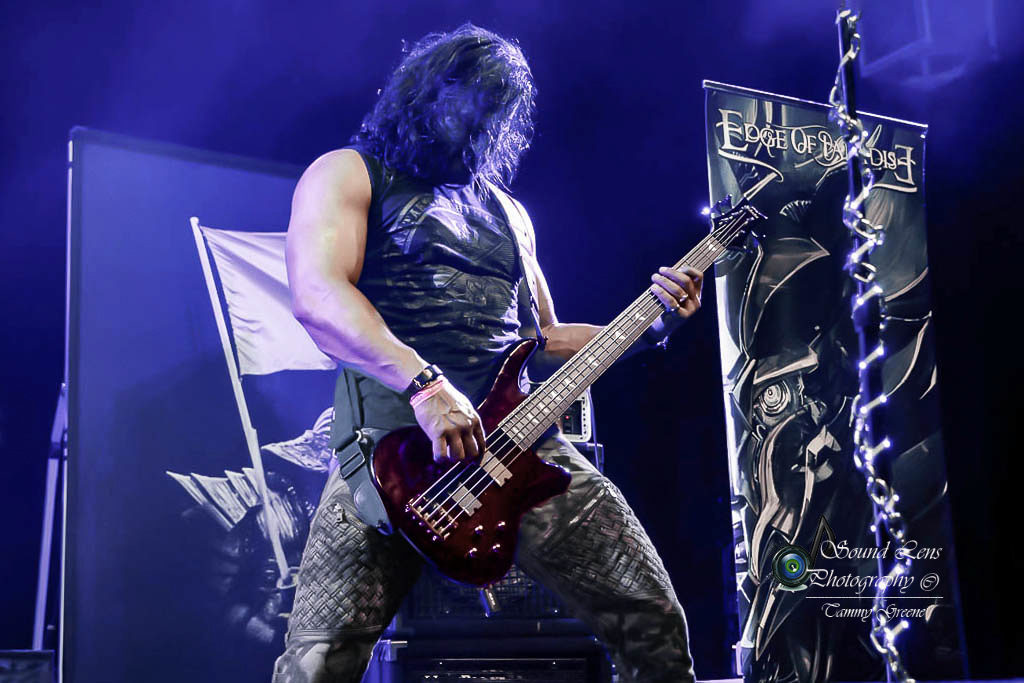
Bates: The conversation was really weird when we first talked to him on the phone, he was like, “I want to get in this band.” And, I’m like what? Then I look at him like he’s a pretty big dude like, if I tell him to come down for a trial, and he gets mad cause he plays like shit I have to tell him, “Oh my God, no.” I don’t know if we should have him try out, and then I heard him play, and I was like, “Okay, he plays well.”
Did you go to Iceland?
Kapetanovic: I did not go to Iceland, but I can’t wait to see it.
Monet: We actually found him in Iceland, you know?
Kapetanovic: I was frozen in the rock.
Ruiz: He was frozen in time–
Bates: Yeah, he was a caveman. [Laughing]
Kapetanovic: Yeah, I think that’s better – I think we should stick with this story, way better than finding me online. He was a perfect match. It was like Tinder for musicians.
Bates: So it’s funny, one of our first conversations is, “I want to get into this band.” And I’m like, “I don’t know, I don’t know” Like you want to get into this band, I mean, we don’t really make that much money, what is it that you want?
Kapetanovic: No, the very first thing I said was, “I really need money, so I really need to get in this band.” And they were like, ” I think you’re just delusional, I don’t know.” I really need money, and I think you guys are like a gold rush.
Ok, moving on. I watched a clip of you Margarita playing the GuitarViol; it has a fantastic tone, very soothing. Is this a new addition to your live performance? Even Edge of Paradise music in general.
Bates: That things really expensive, it’s handmade, and the funny thing is, we contact a guy who said, “Hey, that’s a pretty neat thing” and he’s like I’ll loan you this one. And then I look up the guy that’s playing it, he plays for Marilyn Manson, right, and he has my same last name and I don’t even know him, and he did the soundtrack to “300” and he did trouble [crosstalk] and he’s got my last name, and I’m like fuck, and then maybe I’m related to this guy. Maybe he owes me money.
Monet: Yeah, but I think he let us borrow the guitar, so we put it on some of the songs.
Bates: So we made a new song with it, we made a song out of it, and it’s actually a really cool instrument, and it was awesome of the guy.
Monet: One day I want to add it to our live show and the guy that makes them…
Bates: He makes them by hand, if you order one, you pay like five or six grand for one, you can’t get it for like a year.
Wow.
Bates: Yeah, Toga Man. He called himself Toga Man. So he must have a toga.
Monet: He’s out here somewhere. He has a workshop on up the 23.
Bates: Yeah, I forgot what his real name is, but he goes by Toga Man, it’s like Toga Man, the violist. Toga Man, guitar violist.
What made you want to try it?
Monet: It’s a unique sound.
Bates: It sounded like a violin, and we really liked it.
Monet: But it’s like a very somber kind of open sound. I always look for sounds that make you feel something.
Bates: Yeah, it has a little bit of somber sound, playing element on soundtracks.
Monet: I saw a video of Tyler Bates playing it and it just kind of takes you to another world, I wanted to put a little bit of that in some of the songs.
So, how long did it take you to learn to play?
Monet: Like, a minute.
Bates: Well, I figured it out.
Monet: He was like killing cats.
Bates And she’s like, “Ah, give me that thing.”
Monet: He was like, no, he was killing cats with it.
Bates: I made that song the very first and then she replayed my idea, and she said, “What do you mean? I wrote it.” Like no, I fucking took a week.
Monet: This is always what Dave does.
Bates: I took a week to make this melody, and then she comes along, “Give me that thing.”
Monet: He was killing cats for a week.
Bates: I’ve been playing that thing, and I’m trying to figure out how to bow it.
Monet: And I’m like this is how you do it.
Bates: I tuned it everywhere. I’m tuning it like every different tune and she’s like, “Oh, all right. Give me that thing.” Plays the same melody that I made…
Monet: It’s not yours though.
Bates: Oh, I made it up. I’m like “Yeah, okay.”
Monet: Oh my god, you’re such a liar.
[Laughing]
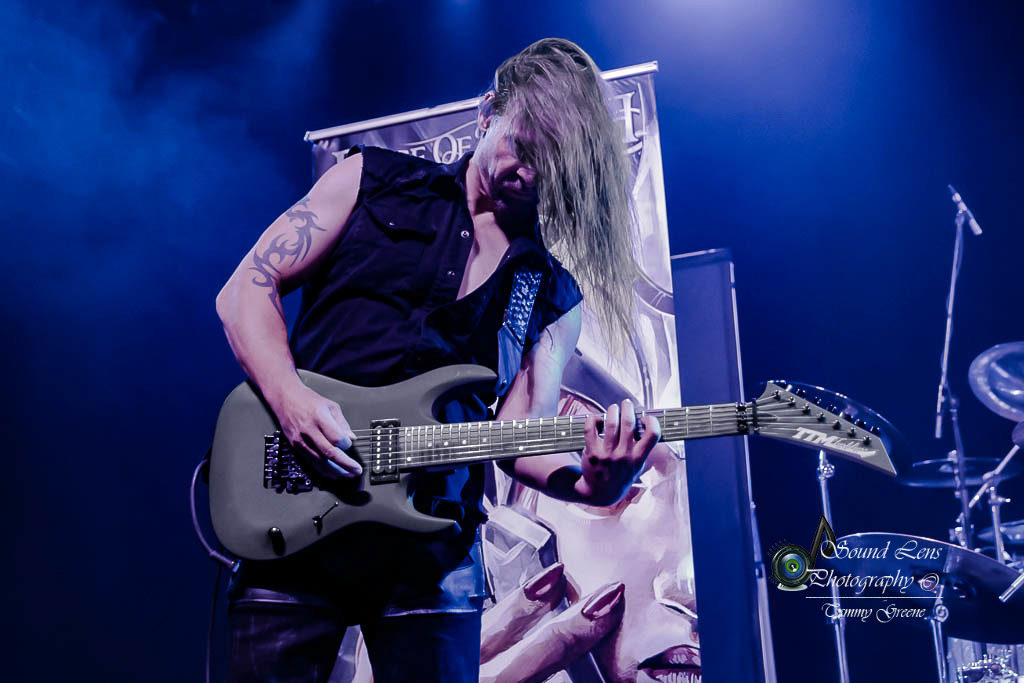
I understand there is a book, a six-year anniversary book about the trials and tribulations Edge of Paradise has experienced. Give us an insight into the book and where the fans can purchase it?
Bates: We have one here.
Monet: The book. We have one here. I’ll show it to you, but it’s. Basically, I dug up some really old photos of Dave and I. It’s kind of like a photo journal with different stories that have been shared and some lyrics and all the artwork of the band.
Bates: People we’ve met.
Chominsky: A lot of cool places, lots of cool people.
Monet: Yeah, like our travels. Just everything about our journey that some people might not know, and a lot of stuff we haven’t shared. So yeah, you can find it on our website; edgeofparadiseband.com.
Dave: Yeah, she did a really good job of putting it all together. It has a nice cover, a nice book.
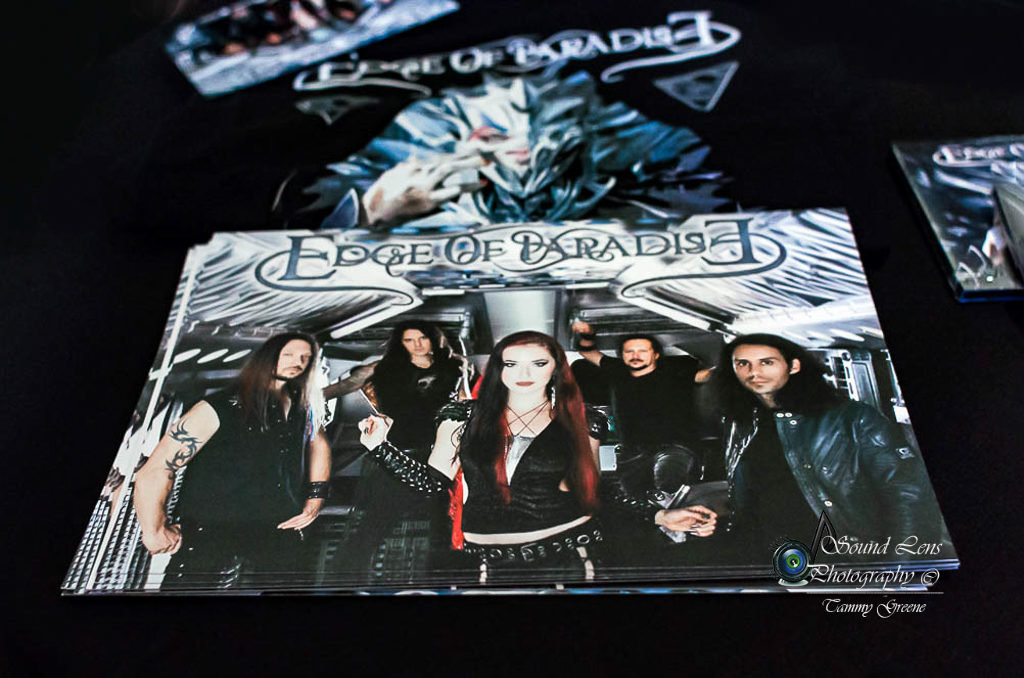
We’ve come to the end of the interview, is there anything I have missed, or you would like to say to the fans?
Monet: I think we covered a lot of ground.
I thought this would be a short one because we just talked at NAMM.
Monet: A lot has happened, huh?
Yes, a lot has happened.
Monet: We just want to thank everyone for supporting us. We feel very grateful to our fans. We have a lot of really loyal support, and without you guys, we can’t do what we do. Look out for the new music. I think you guys are going to love it; it’s really something special that we’re going to be putting out. So look out for the new music, new videos, new shows, and I want to mention we are going to Japan in January.
Bates: Yeah, in January. The CD should be coming out like the beginning of January; then we go to Japan.
Monet: Yeah, Japan. So if you’re in Japan, we’re coming.
Bates: Tokyo.
Monet: But when the album is out, we’re definitely going to be touring a lot more, Europe is the place, we went to the Netherlands now we want to head to the rest of Europe and really do an extended tour.
Bates: We’ll have to sell a lot of postcards.
Monet: Yes. [Laughing].
Bates: Yeah, we’re going to up it, $12.00, going to $11.95.
Kapetanovic: And don’t forget every town in Europe that we hit, we’re going to have at least five to six hundred women from Chippendales that know me. They will come to the show.
Monet: There you go.
Bates: All right, we’ll hold you to it. They got to buy a postcard.
Kapetanovic: Seriously, one thing, fans should pay attention to the next album because I do believe listening to the previous record that I was not on, and listening to what they have to say now, it does sound like kind of a new face of Edge of Paradise.
Bates: When my Punching Teeth comes out, Oh no, Breaking Teeth.
Ruiz: I like Punching Teeth better.
Bates: Yes, Punching Teeth. I got the song already. The title track is done.
Monet: You’re going to be killing some cats with the GuitarViol.
Bates: These guys have heard Punching Teeth. It’s coming.
Okay. Okay, I’ve lost all control of this interview we’re done. We’re done.
[Laughing].
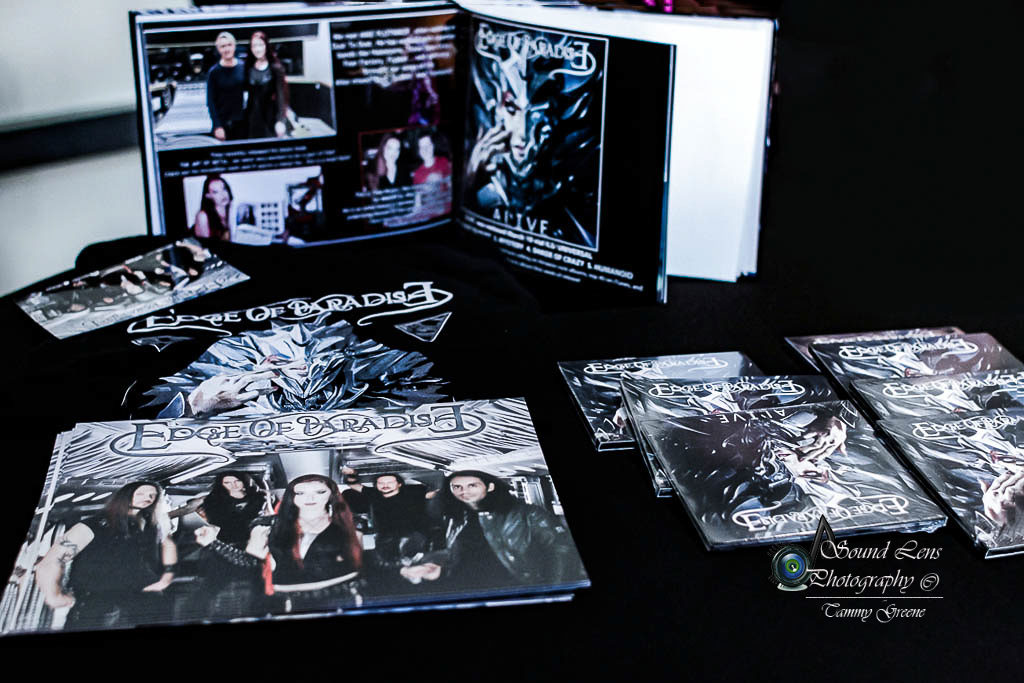
Connect with Edge of Paradise on all social media.
